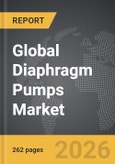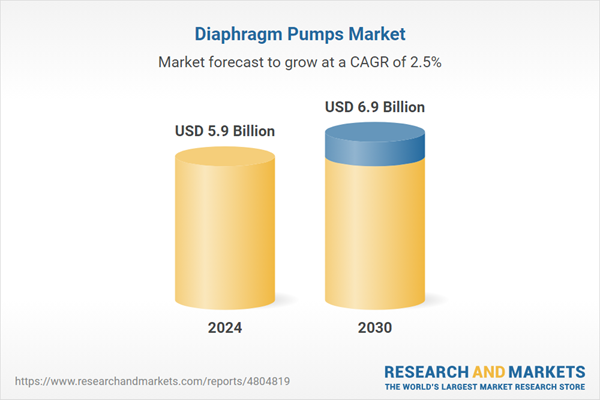Global Diaphragm Pumps Market - Key Trends and Drivers Summarized
How Do Diaphragm Pumps Enhance Industrial Fluid Management?
Diaphragm pumps, known for their reliability and efficiency, are essential tools in the management of fluids across various industries. These pumps use a flexible diaphragm that moves back and forth to create a temporary chamber, which draws in and expels fluid through check valves. They are particularly valued for their ability to handle viscous liquids or those containing solids without damage, making them ideal for applications in chemical processing, food and beverage production, and pharmaceuticals. The simplicity of their design contributes to low maintenance costs and high durability, as the diaphragm can be made from materials resistant to chemicals and physical wear. Moreover, the gentle pumping action of diaphragm pumps makes them suitable for sensitive applications where shearing of the pumped product must be avoided.What Innovations Are Shaping the Future of Diaphragm Pumps?
Technological advancements continue to refine the functionality and expand the applications of diaphragm pumps. Innovations in materials technology have led to the development of diaphragms that can withstand more extreme temperatures and corrosive chemicals, thereby increasing their suitability for challenging industrial environments. Additionally, modern diaphragm pumps are being equipped with smart capabilities, such as integration with IoT (Internet of Things) devices that enable remote monitoring and control. This connectivity allows for real-time data collection regarding the pump's performance and the fluid characteristics, enabling predictive maintenance and optimized operation. These advancements not only enhance the efficiency and reliability of diaphragm pumps but also contribute to safer and more environmentally friendly operations by preventing leaks and minimizing energy use.Why Are Diaphragm Pumps Preferred in Critical and Harsh Environments?
Diaphragm pumps are especially favored for use in critical and harsh environments due to their robust design and operational safety. The sealed chamber of the diaphragm pump provides an inherent safety advantage, making it suitable for transferring hazardous or toxic substances, as it minimizes the risk of leaks and exposure. Their capability to dry run without damage also adds to their reliability in unpredictable conditions where other types of pumps might fail. Industries such as water treatment, mining, and construction rely on diaphragm pumps not only for their durability but also for their ability to pump abrasive or particulate-laden fluids. The versatility in media handling, coupled with the potential for portable operation, makes them indispensable in scenarios where fluid transfer needs vary frequently.What Drives the Growing Market for Diaphragm Pumps?
The growth in the diaphragm pump market is driven by several factors, including the expanding reach of industries requiring robust fluid handling solutions, such as water treatment, biotechnology, and chemical manufacturing. The shift towards automation and smart industrial equipment has also significantly contributed to the increased adoption of advanced diaphragm pumps. As industries continue to enforce stricter environmental and safety regulations, the demand for reliable and safe pumping equipment, capable of handling hazardous materials with minimal risk, is expected to rise. Consumer behavior has shifted towards equipment that offers longer service life and reduced operational costs, further fueling the demand for diaphragm pumps. Additionally, the global expansion of the food and beverage industry, which requires sanitary and gentle handling of liquids, supports the growth of this market. These drivers, together with continuous improvements in pump technology and integration with digital systems, are set to keep the diaphragm pump market dynamic and growing.Report Scope
The report analyzes the Diaphragm Pumps market, presented in terms of market value (USD). The analysis covers the key segments and geographic regions outlined below.- Segments: Mechanism (Air Operated, Electrically Operated); Mode (Double Acting, Single Acting); End-Use (Water & Wastewater, Oil & Gas, Chemicals & Petrochemicals, Pharmaceuticals, Food & Beverage, Other End-Uses).
- Geographic Regions/Countries: World; United States; Canada; Japan; China; Europe (France; Germany; Italy; United Kingdom; Spain; Russia; and Rest of Europe); Asia-Pacific (Australia; India; South Korea; and Rest of Asia-Pacific); Latin America (Argentina; Brazil; Mexico; and Rest of Latin America); Middle East (Iran; Israel; Saudi Arabia; United Arab Emirates; and Rest of Middle East); and Africa.
Key Insights:
- Market Growth: Understand the significant growth trajectory of the Air Operated Diaphragm Pumps segment, which is expected to reach US$4.2 Billion by 2030 with a CAGR of 2.8%. The Electrically Operated Diaphragm Pumps segment is also set to grow at 2.1% CAGR over the analysis period.
- Regional Analysis: Gain insights into the U.S. market, valued at $1.6 Billion in 2024, and China, forecasted to grow at an impressive 4.7% CAGR to reach $1.4 Billion by 2030. Discover growth trends in other key regions, including Japan, Canada, Germany, and the Asia-Pacific.
Why You Should Buy This Report:
- Detailed Market Analysis: Access a thorough analysis of the Global Diaphragm Pumps Market, covering all major geographic regions and market segments.
- Competitive Insights: Get an overview of the competitive landscape, including the market presence of major players across different geographies.
- Future Trends and Drivers: Understand the key trends and drivers shaping the future of the Global Diaphragm Pumps Market.
- Actionable Insights: Benefit from actionable insights that can help you identify new revenue opportunities and make strategic business decisions.
Key Questions Answered:
- How is the Global Diaphragm Pumps Market expected to evolve by 2030?
- What are the main drivers and restraints affecting the market?
- Which market segments will grow the most over the forecast period?
- How will market shares for different regions and segments change by 2030?
- Who are the leading players in the market, and what are their prospects?
Report Features:
- Comprehensive Market Data: Independent analysis of annual sales and market forecasts in US$ Million from 2024 to 2030.
- In-Depth Regional Analysis: Detailed insights into key markets, including the U.S., China, Japan, Canada, Europe, Asia-Pacific, Latin America, Middle East, and Africa.
- Company Profiles: Coverage of players such as Flowserve Corporation, Grundfos Holding A/S, Idex Corporation, Ingersoll-Rand PLC, Leak-Proof Pumps (I) Pvt. Ltd. and more.
- Complimentary Updates: Receive free report updates for one year to keep you informed of the latest market developments.
Some of the 78 companies featured in this Diaphragm Pumps market report include:
- Flowserve Corporation
- Grundfos Holding A/S
- Idex Corporation
- Ingersoll-Rand PLC
- Leak-Proof Pumps (I) Pvt. Ltd.
- Lewa GmbH
- Pump Solutions Group
- Tapflo AB
- Verder International BV
- Xylem, Inc.
- Yamada Corporation
This edition integrates the latest global trade and economic shifts into comprehensive market analysis. Key updates include:
- Tariff and Trade Impact: Insights into global tariff negotiations across 180+ countries, with analysis of supply chain turbulence, sourcing disruptions, and geographic realignment. Special focus on 2025 as a pivotal year for trade tensions, including updated perspectives on the Trump-era tariffs.
- Adjusted Forecasts and Analytics: Revised global and regional market forecasts through 2030, incorporating tariff effects, economic uncertainty, and structural changes in globalization. Includes historical analysis from 2015 to 2023.
- Strategic Market Dynamics: Evaluation of revised market prospects, regional outlooks, and key economic indicators such as population and urbanization trends.
- Innovation & Technology Trends: Latest developments in product and process innovation, emerging technologies, and key industry drivers shaping the competitive landscape.
- Competitive Intelligence: Updated global market share estimates for 2025, competitive positioning of major players (Strong/Active/Niche/Trivial), and refined focus on leading global brands and core players.
- Expert Insight & Commentary: Strategic analysis from economists, trade experts, and domain specialists to contextualize market shifts and identify emerging opportunities.
Table of Contents
Companies Mentioned (Partial List)
A selection of companies mentioned in this report includes, but is not limited to:
- Flowserve Corporation
- Grundfos Holding A/S
- Idex Corporation
- Ingersoll-Rand PLC
- Leak-Proof Pumps (I) Pvt. Ltd.
- Lewa GmbH
- Pump Solutions Group
- Tapflo AB
- Verder International BV
- Xylem, Inc.
- Yamada Corporation
Table Information
| Report Attribute | Details |
|---|---|
| No. of Pages | 262 |
| Published | February 2026 |
| Forecast Period | 2024 - 2030 |
| Estimated Market Value ( USD | $ 5.9 Billion |
| Forecasted Market Value ( USD | $ 6.9 Billion |
| Compound Annual Growth Rate | 2.5% |
| Regions Covered | Global |









